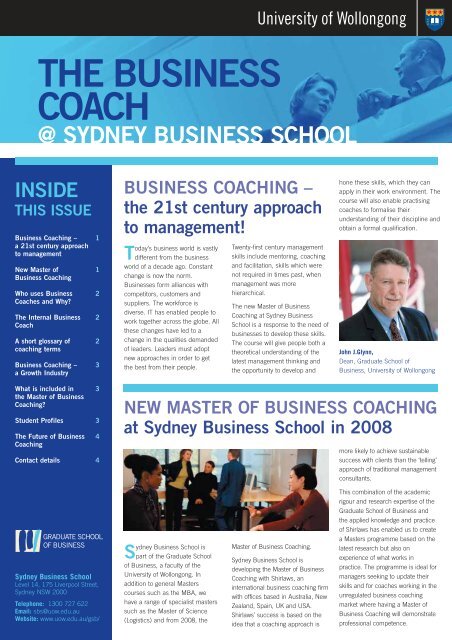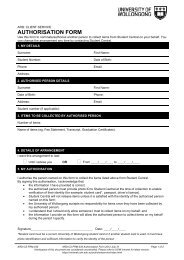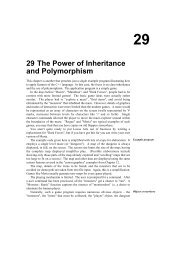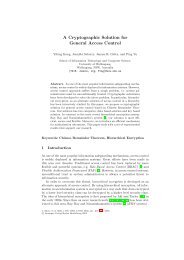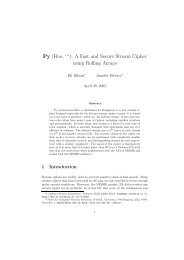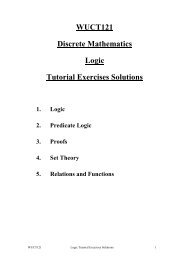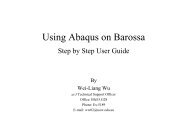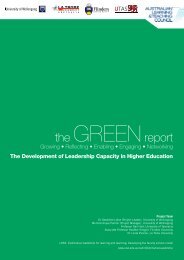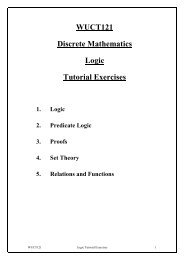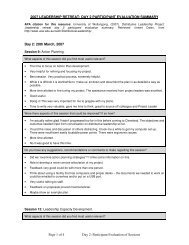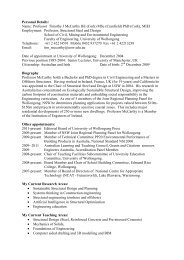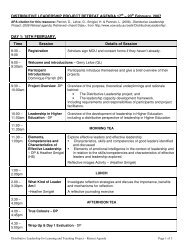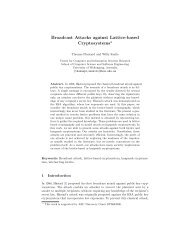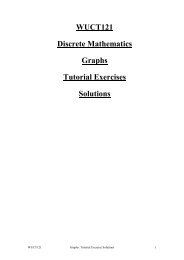THE BUSINESS COACH - University of Wollongong
THE BUSINESS COACH - University of Wollongong
THE BUSINESS COACH - University of Wollongong
Create successful ePaper yourself
Turn your PDF publications into a flip-book with our unique Google optimized e-Paper software.
<strong>THE</strong> <strong>BUSINESS</strong><br />
<strong>COACH</strong><br />
@ SYDNEY <strong>BUSINESS</strong> SCHOOL<br />
INSIDE<br />
THIS ISSUE<br />
Business Coaching – 1<br />
a 21st century approach<br />
to management<br />
New Master <strong>of</strong> 1<br />
Business Coaching<br />
Who uses Business 2<br />
Coaches and Why?<br />
The Internal Business 2<br />
Coach<br />
A short glossary <strong>of</strong> 2<br />
coaching terms<br />
Business Coaching – 3<br />
a Growth Industry<br />
What is included in 3<br />
the Master <strong>of</strong> Business<br />
Coaching?<br />
Student Pr<strong>of</strong>iles 3<br />
The Future <strong>of</strong> Business 4<br />
Coaching<br />
Contact details 4<br />
Sydney Business School<br />
Level 14, 175 Liverpool Street,<br />
Sydney NSW 2000<br />
Telephone: 1300 727 622<br />
Email: sbs@uow.edu.au<br />
Website: www.uow.edu.au/gsb/<br />
<strong>BUSINESS</strong> <strong>COACH</strong>ING –<br />
the 21st century approach<br />
to management!<br />
Today’s business world is vastly<br />
different from the business<br />
world <strong>of</strong> a decade ago. Constant<br />
change is now the norm.<br />
Businesses form alliances with<br />
competitors, customers and<br />
suppliers. The workforce is<br />
diverse. IT has enabled people to<br />
work together across the globe. All<br />
these changes have led to a<br />
change in the qualities demanded<br />
<strong>of</strong> leaders. Leaders must adopt<br />
new approaches in order to get<br />
the best from their people.<br />
Sydney Business School is<br />
part <strong>of</strong> the Graduate School<br />
<strong>of</strong> Business, a faculty <strong>of</strong> the<br />
<strong>University</strong> <strong>of</strong> <strong>Wollongong</strong>. In<br />
addition to general Masters<br />
courses such as the MBA, we<br />
have a range <strong>of</strong> specialist masters<br />
such as the Master <strong>of</strong> Science<br />
(Logistics) and from 2008, the<br />
Twenty-first century management<br />
skills include mentoring, coaching<br />
and facilitation, skills which were<br />
not required in times past, when<br />
management was more<br />
hierarchical.<br />
The new Master <strong>of</strong> Business<br />
Coaching at Sydney Business<br />
School is a response to the need <strong>of</strong><br />
businesses to develop these skills.<br />
The course will give people both a<br />
theoretical understanding <strong>of</strong> the<br />
latest management thinking and<br />
the opportunity to develop and<br />
Master <strong>of</strong> Business Coaching.<br />
Sydney Business School is<br />
developing the Master <strong>of</strong> Business<br />
Coaching with Shirlaws, an<br />
international business coaching firm<br />
with <strong>of</strong>fices based in Australia, New<br />
Zealand, Spain, UK and USA.<br />
Shirlaws’ success is based on the<br />
idea that a coaching approach is<br />
hone these skills, which they can<br />
apply in their work environment. The<br />
course will also enable practising<br />
coaches to formalise their<br />
understanding <strong>of</strong> their discipline and<br />
obtain a formal qualification.<br />
John J.Glynn,<br />
Dean, Graduate School <strong>of</strong><br />
Business, <strong>University</strong> <strong>of</strong> <strong>Wollongong</strong><br />
NEW MASTER OF <strong>BUSINESS</strong> <strong>COACH</strong>ING<br />
at Sydney Business School in 2008<br />
more likely to achieve sustainable<br />
success with clients than the ‘telling’<br />
approach <strong>of</strong> traditional management<br />
consultants.<br />
This combination <strong>of</strong> the academic<br />
rigour and research expertise <strong>of</strong> the<br />
Graduate School <strong>of</strong> Business and<br />
the applied knowledge and practice<br />
<strong>of</strong> Shirlaws has enabled us to create<br />
a Masters programme based on the<br />
latest research but also on<br />
experience <strong>of</strong> what works in<br />
practice. The programme is ideal for<br />
managers seeking to update their<br />
skills and for coaches working in the<br />
unregulated business coaching<br />
market where having a Master <strong>of</strong><br />
Business Coaching will demonstrate<br />
pr<strong>of</strong>essional competence.
<strong>THE</strong> <strong>BUSINESS</strong> <strong>COACH</strong> @ SYDNEY<br />
Internal business<br />
coaches understand<br />
the business and<br />
help colleagues<br />
define and achieve<br />
business goals<br />
Who uses Business Coaches and why?<br />
Many different organisations<br />
hire the services <strong>of</strong> business<br />
coaches. For some, the reason is<br />
quite simple, they do not have<br />
the expertise or resource inhouse<br />
which the business coach<br />
can bring.<br />
Business coaches use a less<br />
directive approach than<br />
consultants and support their<br />
clients in developing their own<br />
solutions. This approach can be<br />
The Internal<br />
Business<br />
Coach<br />
Internal business coaches give<br />
organisations access to business<br />
coaching experts who also have<br />
indepth knowledge <strong>of</strong> the organisation,<br />
its people, its processes and its<br />
environment. As such, they can be<br />
valuable contributors across the<br />
organisation, using their ability to ask<br />
questions in a nonthreatening way<br />
and their facilitation skills to help their<br />
colleagues define their goals and how<br />
they can achieve them. They help<br />
groups work well together and can<br />
help reduce conflict, resulting in<br />
more productive teamwork.<br />
<strong>BUSINESS</strong> <strong>COACH</strong>ING<br />
Based on a partnership model<br />
where the coach and client work<br />
together, with the coach using<br />
techniques such as facilitation to<br />
help businesses to define and<br />
achieve their goals.<br />
CONSULTANCY<br />
Providing expertise to clients who<br />
require a particular type <strong>of</strong><br />
knowledge or service for a specific<br />
period <strong>of</strong> time.<br />
particularly appealing to Small and<br />
Medium Enterprises (SMEs).<br />
In a 2007 survey, 62% <strong>of</strong> SMEs<br />
globally and 76% in Australia gave<br />
recruitment and retention as the<br />
biggest challenges they face. Chris<br />
Dionne, global director <strong>of</strong> Shirlaws,<br />
said the research showed SMEs<br />
are now focused on getting the<br />
right culture in place and attracting<br />
the right people. Business coaches<br />
are key in helping SMEs improve<br />
COUNSELLING/<strong>THE</strong>RAPY<br />
Helping individuals with personal<br />
difficulties.<br />
EXECUTIVE <strong>COACH</strong>ING<br />
Helping executives set and achieve<br />
organisational goals.<br />
FACILITATION<br />
Helping groups work through<br />
processes, meetings etc.<br />
LIFE <strong>COACH</strong>ING<br />
Helping individuals set and achieve<br />
their leadership capabilities and<br />
change the culture <strong>of</strong> their<br />
organisations.<br />
For large organisations, there is an<br />
advantage in having an outside<br />
person come in to challenge and<br />
help develop more robust business<br />
goals and strategies. The business<br />
coaching approach appeals to<br />
organisations seeking to develop<br />
their own solution and improve<br />
their skills base.<br />
A Short Glossary <strong>of</strong> Coaching Terms<br />
personal goals. It is not counselling<br />
or therapy.<br />
MENTORING<br />
A supporting relationship where a<br />
colleague guides a less experienced<br />
colleague. Mentors provide access<br />
to networks and <strong>of</strong>fer advice, but do<br />
not provide hands-on training.<br />
TRAINING<br />
Imparting knowledge and skills,<br />
whether one-to-one or group, formal<br />
or informal format.
<strong>BUSINESS</strong> SCHOOL<br />
<strong>BUSINESS</strong> <strong>COACH</strong>ING –<br />
A Growth Industry<br />
The Executive and Business<br />
Coaching industry is one <strong>of</strong> the<br />
fastest growing industries around<br />
– growing at about 40% a year,<br />
according to the Economist<br />
(Dec.2005). Worldwide, revenues<br />
from coaching were US$1.5 billion<br />
in 2007, with Australia’s share <strong>of</strong><br />
this US$105 million, according to<br />
a survey carried out for the<br />
International Coaching Federation<br />
by Pricewaterhouse- Coopers.The<br />
Australian Institute <strong>of</strong><br />
Management says that over 70%<br />
<strong>of</strong> its members hire coaches.<br />
Research from the Chartered<br />
Institute <strong>of</strong> Personnel and<br />
Development found that 99 per<br />
cent <strong>of</strong> employers accepted that<br />
coaching can deliver tangible<br />
benefits to both individuals and<br />
organisations, yet half <strong>of</strong> these<br />
organisations struggled to find<br />
accredited coaches. More than<br />
seven out <strong>of</strong> ten (72%) identified<br />
improving individual and business<br />
performance as the main<br />
objectives for developing a<br />
coaching culture. An<br />
overwhelming majority (93%) <strong>of</strong><br />
respondents using coaching said<br />
that they believe that a coaching<br />
The Master <strong>of</strong> Business<br />
Coaching comprises eight<br />
subjects, including two electives.<br />
Students start with an Introduction<br />
to Business Coaching and Applied<br />
Coaching Skills. Students then go<br />
on to apply these skills in<br />
Leadership and People<br />
Management, Business Coaching<br />
Strategy and Planning, Innovation,<br />
Improvement and Change<br />
culture is either ‘very important’ or<br />
‘important’ to the success <strong>of</strong> their<br />
organisation. Research by Clegg et<br />
al (2005)* found that business<br />
coaching is in the early stages <strong>of</strong><br />
development in Australia and that<br />
business coaches are concerned<br />
What is included in the<br />
MASTER OF <strong>BUSINESS</strong> <strong>COACH</strong>ING?<br />
Management. Students then<br />
undertake a research project<br />
related to business coaching.<br />
The two electives can be chosen<br />
by the student to complement their<br />
existing skills. For example, one<br />
student might choose Marketing<br />
and Finance, while another might<br />
choose Logistics and Project<br />
Management. In this way, each<br />
about the lack <strong>of</strong> development, the<br />
lack <strong>of</strong> clarity about the nature <strong>of</strong><br />
business coaching and a lack <strong>of</strong><br />
understanding about what<br />
constitutes best practice. All the<br />
indicators suggest that business<br />
coaching is a young industry with<br />
huge opportunities for personal<br />
and company growth.<br />
*Clegg, S.R. et al. (2005) Business coaching:<br />
challenges for an emerging industry,<br />
Industrial and Commercial Training, vol. 37<br />
No.5 pp. 218-223<br />
student’s programme will allow<br />
them to update their existing<br />
knowledge, strengthen their skills<br />
portfolio and formalise their<br />
qualifications.<br />
The Master <strong>of</strong> Business Coaching<br />
will be delivered at the Sydney<br />
Business School, via a combination<br />
<strong>of</strong> intensive face to face sessions<br />
and eLearning support.<br />
STUDENT<br />
PROFILES<br />
The Master <strong>of</strong> Business<br />
Coaching has been designed<br />
to appeal to a broad range <strong>of</strong><br />
people interested in business<br />
coaching:<br />
• those already working as<br />
business coaches without a<br />
formal qualification,<br />
• those working in companies as<br />
internal coaches,<br />
• those working as<br />
individual/executive coaches<br />
who wish to strengthen their<br />
business understanding,<br />
• consultants or counsellors who<br />
wish to develop their coaching<br />
skills,<br />
• career changers, (e.g. those<br />
who have been re-trenched<br />
and wish to strengthen their<br />
portfolio),<br />
• and managers who wish to<br />
develop coaching skills as part<br />
<strong>of</strong> their management approach.<br />
Note that 47% <strong>of</strong> UK companies<br />
surveyed by the Chartered<br />
Institute <strong>of</strong> Pr<strong>of</strong>essional<br />
Development in 2006 train line<br />
managers in coaching skills.
<strong>THE</strong> <strong>BUSINESS</strong> <strong>COACH</strong><br />
@ SYDNEY <strong>BUSINESS</strong> SCHOOL<br />
CONTACT DETAILS<br />
For further information on the<br />
Sydney Business School’s<br />
Master <strong>of</strong> Business Coaching,<br />
please contact:<br />
Dr Grace McCarthy<br />
Coordinator,<br />
Master Business Coaching,<br />
Sydney Business School<br />
Level 14,<br />
175 Liverpool Street<br />
Sydney NSW 2000<br />
Phone: +61 2 4221 4880<br />
Email:<br />
grace_mccarthy@uow.edu.au<br />
The future <strong>of</strong> <strong>BUSINESS</strong> <strong>COACH</strong>ING<br />
BY CHRIS DIONNE, SHIRLAWS<br />
The future <strong>of</strong> business and the<br />
broader skills now required for<br />
future leaders and industry<br />
participants have never been more<br />
relevant than now.<br />
With the phenomenon <strong>of</strong><br />
“coaching” well and truly upon us,<br />
it is clear that there is a real<br />
opportunity to consider obtaining a<br />
broader range <strong>of</strong> skills, with a<br />
stronger weighting on people<br />
management, using a formulated<br />
methodology, let’s call that<br />
coaching. This is particularly<br />
apparent in today’s business<br />
environment.<br />
Today’s market place is not only<br />
dynamic and fast-paced, there is a<br />
need to enhance, deliver and<br />
utilise different skills. In<br />
The Master <strong>of</strong> Business<br />
Coaching is an exciting new<br />
qualification both for managers<br />
and coaches. However, before you<br />
apply, think seriously about the<br />
other commitments in your life<br />
and whether you have the time to<br />
devote to this very demanding<br />
course. An Open Evening will be<br />
held on 1st November at SBS<br />
businesses, a “blended<br />
communication approach” covering<br />
a broader range <strong>of</strong> disciplines and<br />
more complex skills will be required<br />
by managers in the near future<br />
than perhaps ever before.<br />
Unlike a few years ago, managers,<br />
coaches and people involved in<br />
Interested in the SBS 2008<br />
MASTER OF <strong>BUSINESS</strong><br />
<strong>COACH</strong>ING?<br />
where you can meet SBS and<br />
Shirlaws staff, find out more about<br />
the programme and have your<br />
questions answered. To register<br />
your interest in attending the Open<br />
Evening, please contact Pauline<br />
Oei-Kalyaprasit at<br />
paulineo@uow.edu.au<br />
Applications are already being<br />
accepted for the 2008 Master <strong>of</strong><br />
inspiring and shaping others are<br />
now required to be multi-tasked<br />
individuals. There is now a<br />
requirement to have not only<br />
traditional technical skills, but new<br />
and future leaders will be required<br />
to be much better communicators<br />
and competent “to draw the best”<br />
out <strong>of</strong> people, and to ensure<br />
people are provided with the best<br />
opportunities by the manager.<br />
Based on research in over 39<br />
countries and 450 businesses, the<br />
challenges for the future will be<br />
culture, staff retention and<br />
succession. It will be critical to<br />
ensure that leaders address these<br />
predicted issues proactively. They<br />
all have a “s<strong>of</strong>t element” to them<br />
and will require people to have the<br />
balance and skills to ensure the<br />
most effective path is followed.<br />
Business Coaching. Postgraduate<br />
Coursework Application forms can<br />
be found at www.uow.edu.au/<br />
prospective/apply/index.html and<br />
should be submitted by 30<br />
November 2007.<br />
Interviews with prospective<br />
candidates will be held in<br />
December 2007 and candidates<br />
will be notified by the end <strong>of</strong><br />
December 2007.<br />
The Master <strong>of</strong> Business Coaching<br />
will begin in February 2008 at<br />
Sydney Business School and will<br />
take two years to complete parttime.<br />
The Sydney Business School<br />
<strong>of</strong>fers state <strong>of</strong> the art facilities in a<br />
unique learning environment.<br />
Located in the heart <strong>of</strong> Sydney’s<br />
Central Business District and<br />
overlooking Hyde Park, SBS has<br />
2000 square metres <strong>of</strong> tailored<br />
learning and teaching space,<br />
including a business-focused<br />
library with access to over 51,000<br />
journal titles, 200,000 journal<br />
volumes, 250 online databases <strong>of</strong><br />
journal articles and 4,000 ebooks.


